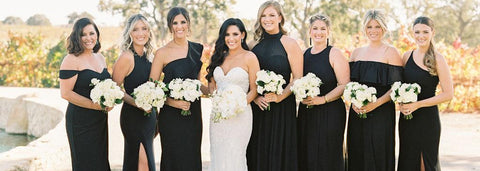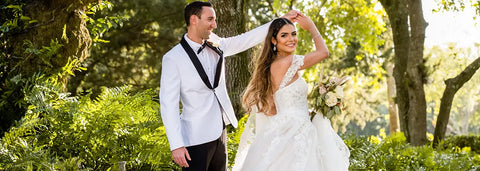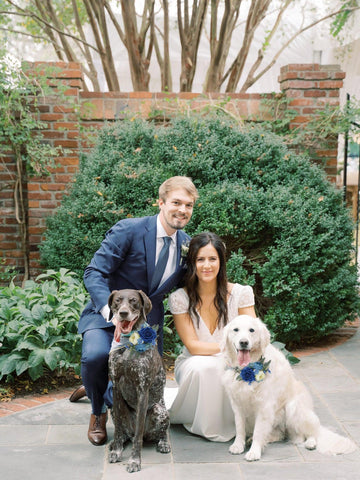From Guest Lists to Venues: How to Simplifying Your Wedding Planning Process ?
Planning a wedding can often feel like navigating a maze of decisions, each turn presenting a new question: from who to invite, what theme to choose, to where to celebrate your special day. This intricate web of choices can quickly become overwhelming, transforming what should be a joyous journey into a daunting task. However, the key to transforming this process into an enjoyable adventure lies in adopting a strategic approach. By prioritizing, organizing, and focusing on what truly matters, you can simplify the wedding planning process, making it less about stress and more about celebrating the love and union that the day represents.
To embark on this journey, it's essential to start with a clear vision and a solid plan. Understanding your priorities, whether it's hosting a grand celebration or a more intimate gathering, sets the foundation for all subsequent decisions. This initial step helps in filtering through the myriad of options, focusing your efforts on what aligns with your vision, and discarding what doesn't. With a strategic approach, you can navigate through the complexities of wedding planning with grace and ease, ensuring that the path leads to a day that reflects both your dreams and your love story.

Start with a Vision
Starting with a vision for your wedding is akin to laying the cornerstone for a building; it's the foundation upon which all other decisions will rest. This vision encompasses more than just the aesthetics of your big day—it's a reflection of the values, experiences, and dreams that you and your partner share. It's about imagining the atmosphere you want to create, the feelings you wish to evoke in your guests, and the memories you aim to cherish for a lifetime. Whether you envision a lavish affair in a grand ballroom or a serene ceremony on a secluded beach, this initial step is crucial. It requires open, heartfelt discussions between you and your partner about what truly matters to both of you. This is the time to dream big, let your imaginations soar, and identify the core elements that will make your wedding uniquely yours.
Expanding on this vision involves considering the details that will bring it to life. Think about the season, the setting, and the theme that best aligns with your shared vision. Do you prefer the warm, vibrant colors of a fall wedding, or the fresh, blossoming backdrop of a spring ceremony? Will your wedding have a modern, minimalist theme, or will it celebrate traditional elements that honor your heritage? These considerations will guide your choices in everything from the venue to the decor, the attire to the music, ensuring that every aspect of your wedding harmonizes with the vision you've set. Remember, this vision serves as a beacon, guiding you through the myriad of decisions and options, and keeping you focused on creating a day that feels authentic and true to who you are as a couple.
Create a Master Checklist
Creating a master checklist is akin to drawing a map for a treasure hunt. It outlines every step you need to take, decision you need to make, and item you need to acquire or arrange before the big day arrives. This checklist becomes your roadmap, guiding you through the wedding planning process systematically. Start by listing all the major categories such as venue, catering, attire, decorations, entertainment, and photography. Under each category, break down the tasks into smaller, manageable actions, such as booking a venue, selecting a menu, choosing outfits, and hiring a photographer. Assign a timeline to each task, spreading them out over the months leading up to your wedding. This not only helps in keeping track of what needs to be done but also prevents the last-minute rush that can lead to stress and oversights.
Moreover, a master checklist allows for delegation. Wedding planning is a massive undertaking, and trying to manage everything alone or as a couple can be overwhelming. With a detailed checklist, you can easily identify tasks that can be handed off to friends, family members, or a professional wedding planner. This not only lightens your load but also involves your loved ones in the preparation of your special day, making the experience more enjoyable and less stressful for everyone involved. Regularly reviewing and updating the checklist ensures that nothing falls through the cracks and that you're on track for a beautifully organized event that mirrors your initial vision.

Prioritize Your Guest List
The task of creating a guest list often stands as one of the most challenging aspects of wedding planning, yet it's undeniably crucial. It's more than just a list of names; it's a delicate balance of relationships, budgets, and venue capacities. Begin by drafting an initial list with your partner, including everyone you might consider inviting. This is your opportunity to think broadly without constraints. Once this comprehensive list is in place, the next step is to categorize it into tiers based on priority: immediate family, close friends, extended family, colleagues, and acquaintances. This tiered approach allows you to visualize who must be at your wedding and who you would like to invite if budget and space permit. Remember, each addition to your guest list impacts your budget and the intimacy of your celebration, making it essential to approach this task with both your heart and practical considerations in mind.
After establishing your priority tiers, revisit your wedding vision and budget. These two elements should guide your final decisions on the guest list. If you're envisioning a small, intimate gathering, you may decide to only invite those in the top tier. Conversely, if you're planning a larger event, you might extend invitations further down your list. It's important to communicate openly with your partner during this process, ensuring that both of you feel represented and comfortable with the final list. Additionally, consider the dynamics of your guest list; think about how your guests will interact and what atmosphere their presence will create on your special day. Ultimately, your guest list should reflect the people who mean the most to you and your partner, those who will add joy and celebration to your wedding day.
Choose a Flexible Venue
Selecting the right venue is a pivotal decision in the wedding planning process, as it sets the stage for your entire celebration. A flexible venue is invaluable, offering various options to accommodate your specific needs and vision. When searching for the perfect location, consider venues that provide different setups for the ceremony, reception, and even a plan B in case of inclement weather. This adaptability is crucial, especially if you're aiming for an outdoor wedding. Moreover, a venue that allows customization in terms of catering, decoration, and layout can make a significant difference. It enables you to tailor the space to fit your theme and guest count perfectly. Some venues offer packages with in-house services like catering, which can simplify your planning process. However, ensure these packages allow for personalization so your wedding doesn't feel cookie-cutter.
In addition to physical flexibility, look for a venue that offers flexibility in terms of vendor policies and setup times. Venues that allow you to bring in your own vendors give you the freedom to choose services that align with your vision and budget. This can be particularly important for catering, photography, and music, as these elements greatly influence the overall vibe of your wedding. Furthermore, a venue that provides ample setup time before the event can relieve a lot of stress. It allows you and your vendors adequate time to decorate and prepare the space without rushing, ensuring everything looks exactly as you envisioned. When touring potential venues, ask about these logistical details. Understanding the level of flexibility and support a venue offers can help you choose a space that not only meets your aesthetic preferences but also ensures a smooth and stress-free celebration.
Leverage Technology
In today's digital age, leveraging technology can significantly streamline the wedding planning process, transforming complex tasks into manageable ones. From budget trackers and guest list organizers to virtual venue tours and online registries, technology offers a plethora of tools designed to simplify every aspect of planning your big day. Start by exploring wedding planning apps and websites that allow you to consolidate your tasks, budgets, and timelines in one place. These platforms often come with customizable checklists and reminders to keep you on track, ensuring no detail is overlooked. Additionally, many apps offer collaborative features, enabling you and your partner to share responsibilities and make decisions together, even when you're apart. This collaborative approach not only lightens the workload but also ensures that both of you are actively involved in every step of the planning process.
Beyond organizational tools, technology can also enhance the wedding experience itself. For instance, creating a wedding website is a fantastic way to keep your guests informed about the details of your day, from the ceremony and reception locations to accommodation options and dress codes. Websites can also be used for RSVPs, making it easier to manage your guest list and meal preferences. Moreover, social media and specialized wedding hashtags allow you to share moments from your engagement, planning journey, and the big day itself, creating a shared digital memory book. Live streaming is another technological marvel, offering a way to include friends and family who can't attend in person, ensuring no one misses out on your special moment. Embracing these technological solutions not only aids in planning but also adds a modern twist to your wedding, making it a unique and memorable experience for everyone involved.

Consider a Longer Engagement
Opting for a longer engagement period can offer numerous benefits that go beyond simply having more time to plan your wedding. This extended timeframe allows couples to thoroughly research and select the best vendors, venues, and details that align with their vision, without the pressure of a looming deadline. It provides the luxury of time to compare prices, services, and availability, ensuring that you're not only making choices that fit your budget but also truly reflect your desires for your special day. Additionally, a longer engagement can be particularly advantageous for securing highly sought-after venues and vendors, which often require booking well in advance. This period also allows for more flexibility in scheduling engagements, bridal showers, and other pre-wedding events, spreading them out to avoid the stress of back-to-back commitments.
Moreover, a longer engagement offers the opportunity for couples to save and budget for their wedding more effectively. With more time to allocate funds, couples can potentially avoid the financial strain that often accompanies wedding planning, leading to a celebration that’s both beautiful and financially responsible. This extended period also allows for deeper engagement with the planning process itself, enabling couples to make thoughtful, considered decisions rather than rushing through choices. For many, this can enhance the overall experience, making the journey to the altar as memorable and enjoyable as the wedding day itself. Furthermore, it provides valuable time for couples to focus on their relationship, ensuring that they enter into marriage with a strong foundation and a clear understanding of their shared goals and dreams.
Delegate Tasks
Delegating tasks during the wedding planning process is not just a strategy for managing the workload; it's a vital approach to ensure that every detail of your special day comes together seamlessly. This delegation goes beyond mere distribution of tasks; it involves entrusting responsibilities to your wedding party, family members, and professionals who can bring their expertise and care to each aspect of your celebration. By identifying the strengths and interests of your support network, you can assign tasks that align with their skills, making the process more efficient and enjoyable for everyone involved. For instance, a friend with a flair for design could oversee the decorations, while a family member who loves music could help curate the perfect playlist. This not only lightens your load but also adds a personal touch to your wedding, as those closest to you contribute in meaningful ways.
Furthermore, delegating tasks allows you to focus on the bigger picture and enjoy the journey to your wedding day. It's easy to get caught up in the minutiae of planning, but when you distribute responsibilities, you free up time to spend with your partner and reflect on the significance of your upcoming marriage. Communication is key in this process; clear instructions and expectations can help prevent misunderstandings and ensure that each task is completed to your satisfaction. Regular check-ins and updates can keep you informed without overwhelming you with details. Remember, delegating is not a sign of relinquishing control but rather a smart strategy to harness the collective effort and talents of your loved ones, making your wedding a truly communal celebration.
Keep Communication Open
Maintaining open lines of communication throughout the wedding planning process is crucial for ensuring that your vision for the big day becomes a reality. This involves regular, clear conversations not only with your partner but also with vendors, family members, and anyone else involved in the planning. Open communication helps in aligning expectations, clarifying details, and promptly addressing any concerns or changes that may arise. For couples, this means discussing preferences, decisions, and compromises openly to ensure that both parties feel heard and represented in the planning process. This foundational aspect of planning can prevent misunderstandings and conflicts, fostering a stronger bond and shared excitement for the upcoming nuptials.
Moreover, effective communication with vendors is equally important. Articulating your vision, budget constraints, and specific requests clearly can help vendors provide the best service possible. It's also essential to establish a regular check-in schedule with them, ensuring that you're updated on progress and any adjustments needed as your wedding day approaches. Similarly, keeping family members and the wedding party informed about plans and their roles can help in managing expectations and responsibilities, making the entire process smoother for everyone involved. Remember, communication is a two-way street; being open to suggestions and feedback can lead to new ideas and improvements, enhancing your wedding day beyond what you initially imagined.
Stay Flexible
Flexibility in wedding planning is not just about being open to change; it's about embracing the unexpected with grace and adaptability. This mindset can be incredibly beneficial, as even the most meticulously planned weddings can encounter unforeseen challenges. Whether it's a vendor cancellation, inclement weather, or a change in guest numbers, the ability to pivot and find creative solutions is invaluable. Staying flexible means having a plan B (and even a plan C) for major elements like location, entertainment, and catering. It's about focusing on the bigger picture—the celebration of your love and commitment—rather than getting bogged down by the details. This approach not only reduces stress but also opens up opportunities for unique and memorable elements to emerge in your wedding.
Moreover, flexibility allows you to take advantage of last-minute opportunities that can enhance your wedding experience. This could be a sudden availability of a preferred vendor, a venue upgrade, or even a special deal on wedding essentials. By maintaining a flexible attitude, you're better positioned to navigate the planning process with ease, making decisions that enhance your day without being strictly bound to an initial plan. It's important to communicate this flexibility to your vendors and wedding party, ensuring they're prepared to adapt to changes as well. Ultimately, staying flexible helps ensure that your wedding day is filled with joy and love, regardless of the small details, making it a truly unforgettable celebration.
Remember the Big Picture
In the whirlwind of wedding planning, it's easy to lose sight of the big picture: the celebration of love and the beginning of a lifelong journey together. Amidst the stress of decision-making and the desire to perfect every detail, remembering the core reason for the day can bring a sense of perspective and peace. This isn't just about a single event but about marking the start of a new chapter in your lives. Keeping this in mind can help mitigate stress over minor issues and focus on what truly matters—sharing this significant moment with loved ones. It's the joy, the vows, and the shared experiences that will be remembered, not the color of the napkins or a slight deviation from the plan.
Furthermore, embracing the big picture encourages couples to invest in aspects of the wedding that have lasting significance. This might mean prioritizing excellent photography that captures the essence of the day, or spending time crafting personal vows that reflect your unique bond. It's about creating a celebration that feels true to you and your partner, one that resonates with your values and vision for the future. By focusing on the big picture, you can navigate the planning process with a sense of calm and purpose, making decisions that enhance the meaningfulness of your wedding day. Remember, this day is a reflection of your love and commitment to each other, a foundation upon which you'll build your future together.





Leave a comment